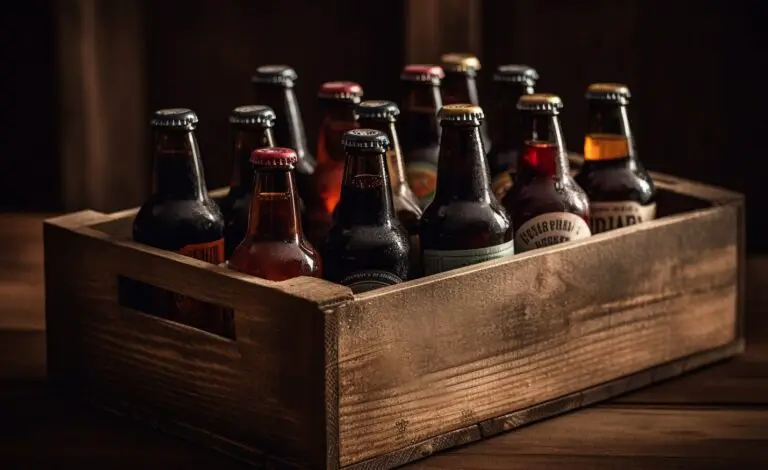Does Beer Have Quercetin?
Quercetin in beer? Does beer have quercetin? Let’s see:
Yes, beer does contain quercetin, albeit in varying amounts depending on the type and brewing process.
Quercetin is present in the hops used to flavor beer, with darker beers generally having higher levels.
However, the exact quantity can be influenced by factors like brewing time and specific ingredients.
While beer can contribute to your overall quercetin intake, it may not provide significant amounts compared to other dietary sources like fruits and vegetables.
Simply put, beer does have quercetin, but don’t rely only on it for your daily dose of quercetin. Make sure you have a balanced diet to get the required daily quercetin dose!

What is Quercetin?
Quercetin is a flavonoid, a type of plant pigment with potent antioxidant properties. Found in various fruits, vegetables, and grains, quercetin contributes to the vibrant colors of many plant-based foods, such as onions, apples, and berries.
Apart from its role in pigmentation, quercetin is renowned for its potential health benefits. It exhibits anti-inflammatory and antiviral properties, supporting overall immune function.
Additionally, quercetin is believed to contribute to cardiovascular health by helping to lower blood pressure and reduce oxidative stress. Due to its diverse health-promoting properties, quercetin is often sought after as a valuable component of a balanced and nutritious diet.

Where Can You Get Your Quercetin Daily Dose?
- capers, raw – 234 mg/100 g
- capers, canned – 173 mg/100 g
- lovage leaves, raw – 170 mg/100 g
- radish, leaves – 70 mg/100 g
- dill weed, fresh – 55 mg/100 g
- coriander – 53 mg/100 g
- onion, red – 32 mg/100 g
The average quercetin content in barley beers varies from 0.06 to 1.79 mg per liter. Dark beers have higher amounts of quercetin, typically above 2 mg per liter.

On average, beer can be a source of quercetin, but the amount of quercetin in it is small. People get most of the quercetin from onions, green or black tea, and asparagus.
Why Is Quercetin Important?
Quercetin is considered important for several reasons due to its potential health benefits:
Antioxidant Properties
Quercetin is a powerful antioxidant that helps neutralize free radicals in the body. Free radicals can contribute to oxidative stress, which is linked to various chronic diseases and aging. By scavenging these free radicals, quercetin may play a role in maintaining overall health.
Anti-Inflammatory Effects
Quercetin has anti-inflammatory properties, which may help reduce inflammation in the body. Chronic inflammation is associated with various health issues, including cardiovascular diseases, arthritis, and certain cancers.
Immune System Support
Some studies suggest that quercetin may enhance the immune system by promoting the activity of immune cells. This immune-boosting potential can contribute to better defense against infections and illnesses.
Heart Health
Quercetin may have cardiovascular benefits, including the ability to lower blood pressure and reduce the risk of heart diseases. It may also help improve cholesterol levels by reducing the oxidation of low-density lipoprotein (LDL) cholesterol.
Potential Antiviral Effects
There is research indicating that quercetin may have antiviral properties, and it has been studied for its potential to inhibit the replication of certain viruses. This aspect is particularly relevant in the context of viral infections.
Cancer Prevention
While more research is needed, some studies suggest that quercetin might have anti-cancer properties. It may help prevent the growth and spread of cancer cells, although this area of research is still in the early stages.

Quercetin in Beer
While beer does contain some quercetin, relying on it as the primary source of this flavonoid might not be the healthiest or most efficient strategy. The quercetin content in beer is generally lower compared to other food sources like fruits, vegetables, and certain legumes. Moreover, the potential negative effects of excessive alcohol consumption should be considered.
It’s crucial to consume a well-balanced diet that includes a variety of foods to ensure you get an adequate amount of essential nutrients, including quercetin. Incorporating fruits (such as apples, berries, and citrus fruits), vegetables (like onions and kale), and legumes (such as beans and lentils) into your diet is a more reliable way to obtain a diverse range of beneficial compounds, including quercetin.
Moderate alcohol consumption, including beer, may be part of a balanced lifestyle for some individuals, but it’s important to be mindful of overall health considerations. Excessive alcohol intake can have adverse effects on health, including liver damage, increased risk of certain cancers, and negative impacts on mental well-being.
Wrapping It Up
In conclusion, while beer does contain quercetin, it’s not the most reliable source for this chemical compound. Quercetin is more abundantly found in fruits, vegetables, and legumes, offering a broader range of health benefits. Enjoying beer in moderation can be part of a balanced lifestyle, but for optimal nutrient intake, focus on a diverse diet rich in colorful and nutrient-dense foods.

I am a young architect with a passion that goes beyond blueprints… it’s beer! undertherosebrewing.com is more than just a blog, it’s a manifestation of my lifelong dream to explore, read, and learn everything about beer. Join the blog on this unfiltered and genuine adventure into the heart of beer culture. Cheers!






